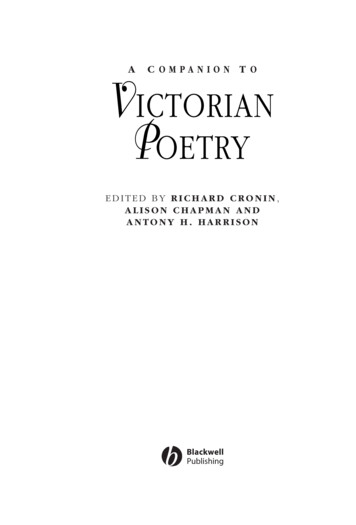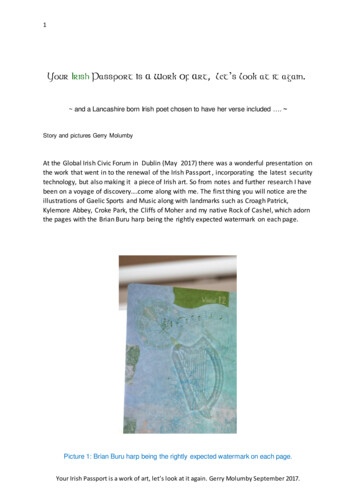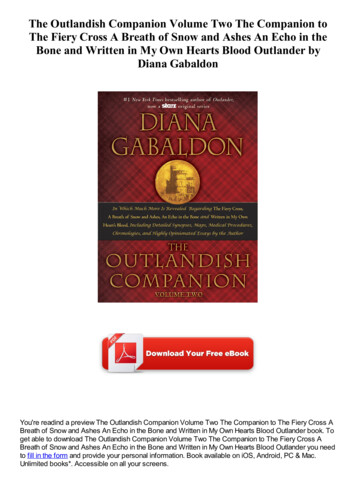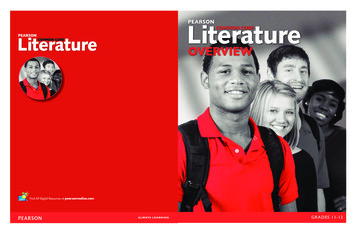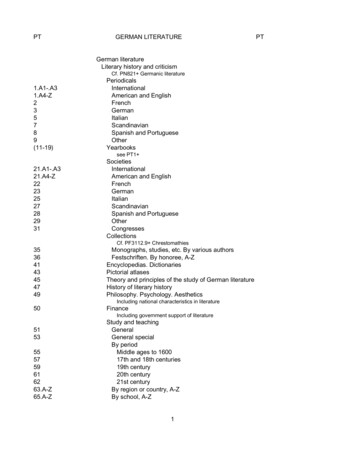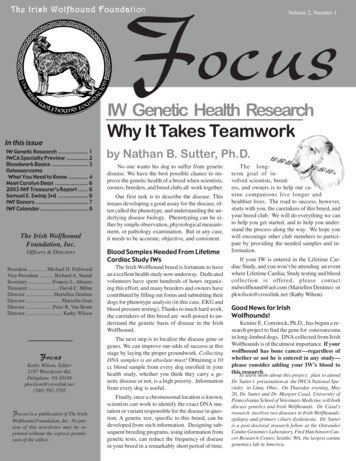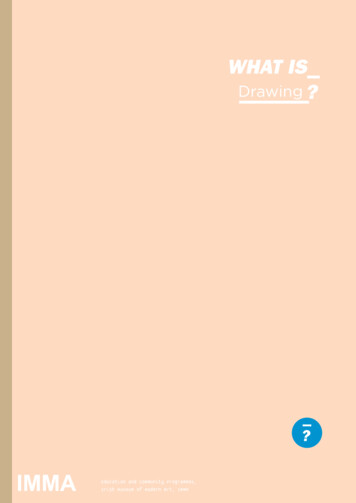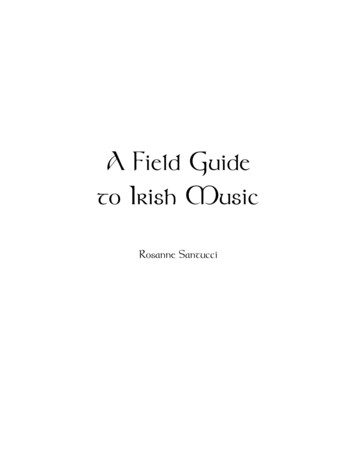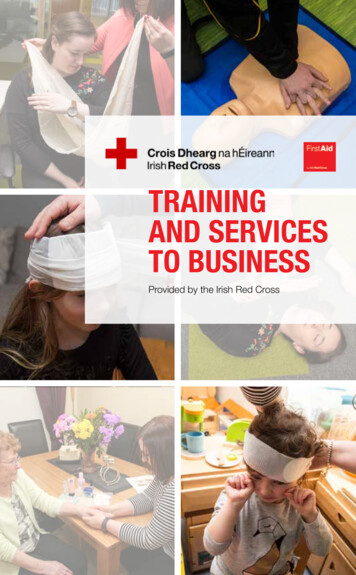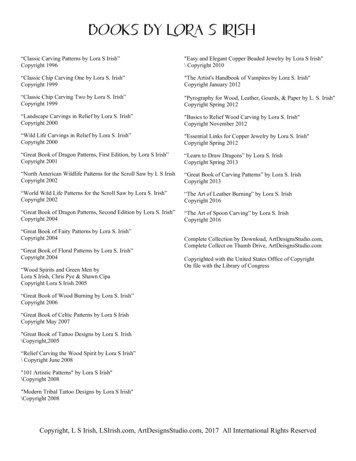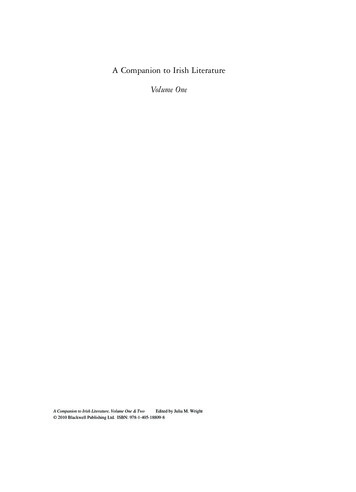
Transcription
A Companion to Irish LiteratureVolume OneA Companion to Irish Literature, Volume One & TwoEdited by Julia M. Wright 2010 Blackwell Publishing Ltd. ISBN: 978-1-405-18809-8
A Companion to Irish LiteratureVolume Two
Blackwell Companions to Literature and CultureThis series offers comprehensive, newly written surveys of key periods and movements and certain majorauthors, in English literary culture and history. Extensive volumes provide new perspectives and positions oncontexts and on canonical and post-canonical texts, orientating the beginning student in new fields of studyand providing the experienced undergraduate and new graduate with current and new directions, as pioneeredand developed by leading scholars in the field.Published Recently53. A Companion to Latin American Literature and Culture54. A Companion to the History of the English Language55. A Companion to Henry James56. A Companion to the British and Irish Short Story57. A Companion to Jane Austen58.59.60.61.62.63.64.65.66.A Companion to the Arthurian LiteratureA Companion to the Modern American Novel 1900–1950A Companion to the Global RenaissanceA Companion to Thomas HardyA Companion to T. S. EliotA Companion to Samuel BeckettA Companion to Twentieth-Century United States FictionA Companion to Tudor LiteratureA Companion to Crime Fiction67. A Companion to Medieval Poetry68. A New Companion to English Renaissance Literature and Culture69. A Companion to the American Short Story70. A Companion to American Literature and Culture71. A Companion to African American Literature72. A Companion to Irish LiteratureEdited by Sara Castro-KlarenEdited by Haruko Momma andMichael MattoEdited by Greg ZachariasEdited by Cheryl Alexander Malcolmand David MalcolmEdited by Claudia L. Johnsonand Clara TuiteEdited by Helen FultonEdited by John T. MatthewsEdited by Jyotsna G. SinghEdited by Keith WilsonEdited by David E. ChinitzEdited by S. E. GontarskiEdited by David SeedEdited by Kent CartwrightEdited by Charles Rzepkaand Lee HorsleyEdited by Corinne SaundersEdited by Michael HattawayEdited by Alfred Bendixenand James NagelEdited by Paul LauterEdited by Gene JarrettEdited by Julia M. Wright
ACO M PA NIONTOI RISHL ITERATUREVolume OneEDITED BYJULIA M. WRIGHTA John Wiley & Sons, Ltd., Publication
ACO M PA NIONTOI RISHL ITERATUREVolume TwoEDITED BYJULIA M. WRIGHTA John Wiley & Sons, Ltd., Publication
This edition first published 2010 2010 Blackwell Publishing Ltd except for editorial material and organization 2010 Julia M. WrightBlackwell Publishing was acquired by John Wiley & Sons in February 2007. Blackwell’s publishingprogram has been merged with Wiley’s global Scientific, Technical, and Medical business to formWiley-Blackwell.Registered OfficeJohn Wiley & Sons Ltd, The Atrium, Southern Gate, Chichester, West Sussex, PO19 8SQ, UnitedKingdomEditorial Offices350 Main Street, Malden, MA 02148-5020, USA9600 Garsington Road, Oxford, OX4 2DQ, UKThe Atrium, Southern Gate, Chichester, West Sussex, PO19 8SQ, UKFor details of our global editorial offices, for customer services, and for information about how toapply for permission to reuse the copyright material in this book please see our website atwww.wiley.com/wiley-blackwell.The right of Julia M. Wright to be identified as the author of the editorial material in this work hasbeen asserted in accordance with the UK Copyright, Designs and Patents Act 1988.All rights reserved. No part of this publication may be reproduced, stored in a retrieval system, ortransmitted, in any form or by any means, electronic, mechanical, photocopying, recording orotherwise, except as permitted by the UK Copyright, Designs and Patents Act 1988, without theprior permission of the publisher.Wiley also publishes its books in a variety of electronic formats. Some content that appears in printmay not be available in electronic books.Designations used by companies to distinguish their products are often claimed as trademarks. Allbrand names and product names used in this book are trade names, service marks, trademarks orregistered trademarks of their respective owners. The publisher is not associated with any product orvendor mentioned in this book. This publication is designed to provide accurate and authoritativeinformation in regard to the subject matter covered. It is sold on the understanding that the publisheris not engaged in rendering professional services. If professional advice or other expert assistance isrequired, the services of a competent professional should be sought.Library of Congress Cataloging-in-Publication DataA companion to Irish literature / edited by Julia M. Wright.p. cm. – (Blackwell companions to literature and culture)Includes bibliographical references and index.ISBN 978-1-4051-8809-8 (hardcover : alk. paper)1. English literature–Irish authors–History and criticism. 2. Epic literature, Irish–Historyand criticism. 3. Irish literature–History and criticism. 4. Northern Ireland–Inliterature. 5. Ireland–In literature. I. Wright, Julia M.PR8711.C66 2010820.9'9417–dc222010011933A catalogue record for this book is available from the British Library.Set in 11 on 13 pt Garamond 3 by Toppan Best-set Premedia LimitedPrinted in Singapore12010
ContentsVOLUME IAcknowledgmentsNotes on ContributorsIntroductionJulia M. WrightPart One: The Middle Agesxixiii1151.Táin Bó CúailngeAnn Dooley172.Finn and the Fenian TraditionJoseph Falaky Nagy273.The Reception and Assimilation of Continental LiteratureBarbara Lisa Hillers39Part Two: The Early Modern Era4.Bardic Poetry, Masculinity, and the Politics of MaleHomosocialitySarah E. McKibben5.Annalists and Historians in Early Modern Ireland, 1450–1700Bernadette Cunningham6.“Hungry Eyes” and the Rhetoric of Dispossession: EnglishWriting from Early Modern IrelandPatricia Palmer7.Kinds of Irishness: Henry Burnell and Richard HeadDeana Rankin57597692108
viContentsPart Three: The Eighteenth Century8.9.Crossing Acts: Irish Drama from George Farquhar toThomas SheridanHelen M. Burke125127Parnell and Early Eighteenth-Century Irish PoetryAndrew Carpenter14210.Jonathan Swift and Eighteenth-Century IrelandClement Hawes16111.Merriman’s Cúirt An Mheonoíche and Eighteenth-CenturyIrish VerseLiam P. Ó Murchú17812.Frances Sheridan and IrelandKathleen M. Oliver19313.“The Indigent Philosopher”: Oliver GoldsmithJames Watt21014.Edmund BurkeLuke Gibbons22615.The Drama of Richard Brinsley SheridanRobert W. Jones243Part Four: The Romantic Period25916.United Irish Poetry and SongsMary Helen Thuente26117.Maria Edgeworth and (Inter)national IntelligenceSusan Manly27618.Mary Tighe: A Portrait of the Artist for the Twenty-First CenturyHarriet Kramer Linkin29219.Thomas Moore: After the BattleJeffery Vail31020.The Role of the Political Woman in the Writings of Lady Morgan(Sydney Owenson)Susan B. Egenolf326Part Five: The Rise of Gothic34321.345Charles Robert Maturin: Ireland’s Eccentric GeniusRobert Miles
Contents22.23.Joseph Sheridan Le Fanu: Gothic Grotesque and theHuguenot InheritanceAlison Milbank362A Philosophical Home Ruler: The Imaginary Geographies ofBram StokerLisa Hopkins377Part Six: The Victorian Era24.viiScribes and Storytellers: The Ethnographic Imagination inNineteenth-Century IrelandStiofán Ó Cadhla39339525.Reconciliation and Emancipation: The Banims and CarletonHelen O’Connell41126.Davis, Mangan, Ferguson: Irish Poetry, 1831–1849Matthew Campbell42727.The Great Famine in Literature, 1846–1896Melissa Fegan44428.Dion Boucicault: From Stage Irishman to Staging NationalismScott Boltwood46029.Oscar Wilde’s Convictions, Speciesism, and the Painof IndividualismDennis Denisoff476VOLUME TWOIntroductionJulia M. Wright1Part Seven: Transitions: Victorian, Revival, Modern1730.Cultural Nationalism and Irish ModernismMichael Mays1931.Defining Irishness: Bernard Shaw and the Irish Connection onthe English StageChristopher Innes3532.The Novels of Somerville and RossVera Kreilkamp5033.W.B. Yeats and the Dialectics of MisrecognitionGregory Castle66
viiiContents34.John Millington Synge – Playwright and PoetAnn Saddlemyer8335.James Joyce and the Creation of Modern Irish LiteratureMichael Patrick Gillespie98Part Eight: Developments in Genre and Representation after 193036.The Word of Politics/Politics of the Word: Immanence andTransdescendence in Sean O’Casey and Samuel BeckettSandra Wynands11311537.Elizabeth Bowen: A Home in WritingEluned Summers-Bremner12938.Changing Times: Frank O’Connor and Seán O’FaoláinPaul Delaney14439.“Ireland is small enough”: Louis MacNeice and Patrick KavanaghAlan Gillis15940.Irish Mimes: Flann O’BrienJoseph Brooker176Part Nine: Debating Social Change after 196019341.Reading William Trevor and Finding Protestant IrelandGregory A. Schirmer19542.The Mythopoeic Ireland of Edna O’Brien’s FictionMaureen O’Connor20943.Anglo-Irish Conflict in Jennifer Johnston’s FictionSilvia Diez Fabre22444.Living History: The Importance of Julia O’Faolain’s FictionChristine St Peter23445.Holding a Mirror Up to a Society in Evolution: John McGahernEamon Maher248Part Ten: Contemporary Literature: Print, Stage, and Screen26346.Brian Friel: From Nationalism to Post-NationalismF.C. McGrath26547.Telling the Truth Slant: The Poetry of Seamus HeaneyEugene O’Brien281
Contentsix48.Belfast Poets: Michael Longley, Derek Mahon, and Medbh McGuckianRichard Rankin Russell29649.Eiléan Ní Chuilleanáin’s Work of WitnessGuinn Batten31250.Eavan Boland’s Muse MothersHeather Clark32851.John Banville’s Dualistic UniverseElke D’hoker34552.Between History and Fantasy: The Irish Films of Neil JordanBrian McIlroy36053.“Keeping That Wound Green”: The Poetry of Paul MuldoonDavid Wheatley37454.Nuala Ní Dhomhnaill and the “Continuously Contemporary”Frank Sewell39055.The Anxiety of Influence and the Fiction of Roddy DoyleDanine Farquharson41056.The Reclamation of “Injurious Terms” in Emma Donoghue’s FictionJennifer M. Jeffers42557.Martin McDonagh and the Ethics of Irish StorytellingPatrick Lonergan436Index451
AcknowledgmentsI would like to thank, first and foremost, my contributors for all of their work on thisproject, many of them completing their essays under especially challenging circumstances – including a happy total of seven births across the two volumes. Their steadygood humor, thoughtful responses, and patience with my queries, requests, andnudges helped to make editing these volumes a very pleasant experience as well as anintellectually rewarding one.I am also grateful to the Canada Research Chairs Program and the Social Sciencesand Humanities Research Council of Canada for their indispensable support, and toGordon Miller for his very careful and thorough work as a research assistant. Mythanks as well to Dalhousie University for providing me with a sabbatical essentialto the timely completion of the manuscript and to the Killam Library, and especiallythe incredibly efficient Interlibrary Loan Department, for its invaluable assistance. Mycolleagues at Dalhousie have, as always, been a source of both collegial calm andintellectual excitement, creating an energizing environment for scholarship. IsobelBainton and Emma Bennett at Wiley-Blackwell offered their usual excellent adviceand they, along with others at the press, made Wiley-Blackwell once again a joy towork with. And, above all, I thank Jason Haslam, for everything and always, including steady encouragement about work and much laughter (and sci-fi) at home.
Notes on ContributorsGuinn Batten is the author of The Orphaned Imagination: Melancholy and CommodityCulture in English Romanticism (1998), a contributor to The Cambridge History of IrishLiterature, the editor (and author of an Afterword for) Medbh McGuckian’s The Soldiersof Year II (2002), and the author of a dozen essays on contemporary Irish poetry thatinclude contributions to two Cambridge Companions.Scott Boltwood is the author of Brian Friel, Ireland, and the North (2007) and articleson Dion Boucicault, Augusta Gregory, Brian Friel, and the Ulster Group Theatre.He has been a Research Fellow at the Academy of Irish Cultural Heritages, Universityof Ulster, and Visiting Professor at Queen’s University Belfast. He is currently anAssociate Professor at Emory & Henry College.Joseph Brooker teaches modern literature at Birkbeck College, University of London.He is the author of Joyce’s Critics: Transitions in Reading & Culture (2004) and FlannO’Brien (2005). He has co-edited special issues of the Journal of Law & Society (onlaw and literature) and New Formations (on the 1990s). His next book concerns theliterature of the 1980s.Helen M. Burke is a Professor of English at Florida State University. She is the authorof Riotous Performances: The Struggle for Hegemony in the Irish Theatre, 1712–1784 (2003),and is currently completing a book on the Irish diaspora and the eighteenth-centuryLondon stage.Matthew Campbell teaches English literature at the University of Sheffield. He isthe author of Rhythm and Will in Victorian Poetry (1999) and editor of The CambridgeCompanion to Modern Irish Poetry (2003), as well as co-editor of two volumes onnineteenth-century literature.Andrew Carpenter is Emeritus Professor of English at University College Dublinand a Member of the Royal Irish Academy. His most significant publications in recentyears are two anthologies, Verse in English from Eighteenth-Century Ireland (1998) andVerse in English from Tudor and Stuart Ireland (2003).
xivNotes on ContributorsGregory Castle is Professor of British and Irish Literature at Arizona State University.He has published Modernism and the Celtic Revival (2001), Reading the ModernistBildungsroman (2006), and the Blackwell Guide to Literary Theory (2007). He also editedPostcolonial Discourses (2000) and is editor of volume 1 (1900–66) of the BlackwellEncyclopedia of Literary and Cultural Theory (2010). He is currently working on a bookproject, “Inventing Souls: Pedagogies of Irish Revivalism.”Heather Clark is Professor of Literature at Marlboro College in Marlboro, Vermont,and teaches at NYU’s Glucksman Ireland House. She is the author of The UlsterRenaissance: Poetry in Belfast 1962–1972 (2006), and a forthcoming book on SylviaPlath and Ted Hughes. She reviews Irish poetry for the Harvard Review, and is currently working on a book about Paul Muldoon.Bernadette Cunningham is Deputy Librarian of the Royal Irish Academy, Dublin.She is author of The World of Geoffrey Keating: History, Myth and Religion in SeventeenthCentury Ireland (2000) and The Annals of the Four Masters: Irish History, Kingship andSociety in the Early Seventeenth Century (2010).Paul Delaney is a Lecturer in the School of English, Trinity College Dublin. Hiswork includes the edited collection Reading Colm Tóibín (2008). He has written widelyon Irish literature and on representations of Travelers in Irish writing. Current projectsinclude an essay collection on William Trevor (co-edited with Michael Parker) and astudy of Seán O’Faoláin.Dennis Denisoff is the Chair of English at Ryerson University, Toronto. His currentresearch focuses on nineteenth-century decadence, paganism, and non-human animals’subjectivity. Past publications include Aestheticism and Sexual Parody: 1840–1940(2001) and Sexual Visuality from Literature to Film: 1850–1950 (2004).Elke D’hoker is an Associate Professor at the University of Leuven, Belgium. Shehas written a critical study of John Banville’s work (Rodopi 2004) and has publishedseveral articles on modern and contemporary Irish fiction. She is currently workingon a book about the modern short story by Irish women writers.Ann Dooley is a professor with the Centre for Medieval Studies and the Program forCeltic Studies at the University of Toronto. She is the author of Playing the Hero:Reading the Táin Bó Cúailnge (2006).Susan B. Egenolf, Associate Professor at Texas A&M University, teaches courses inBritish and Irish literature and culture. She authored The Art of Political Fiction inHamilton, Edgeworth, and Owenson (2009) and has published essays focused uponwomen writers and the intersection of literature and visual culture. Her currentproject investigates the works of Josiah Wedgwood and the cultivation of eighteenthcentury aesthetics.Silvia Diez Fabre is Lecturer in English Literature at the University of Burgos, Spain.She is a founder member of the Spanish Association for Irish Studies and was itsSecretary until 2008. She has published essays about the literary interpretation of the
Notes on ContributorsxvBig House in nineteenth- and twentieth-century Irish fiction. Her interest in JenniferJohnston’s fiction grew from this area of studies.Danine Farquharson is Associate Professor of Irish Literature at Memorial Universityin St John’s, Newfoundland, Canada. She is co-editor of Shadows of the Gunmen: Violenceand Culture in Modern Ireland (2008) and has published and presented papers on RoddyDoyle, Robert McLiam Wilson, Edna O’Brien, John McGahern, and Liam O’Flaherty.Melissa Fegan is a Reader in the Department of English at the University of Chester.She is the author of Literature and the Irish Famine 1845–1919 (2002); she is currentlyworking on the poetry and prose of James Clarence Mangan, and twentieth- andtwenty-first-century representations of the Great Famine.Luke Gibbons is Professor of Irish Literary and Cultural Studies at the NationalUniversity of Ireland, Maynooth, and the author of such books as Edmund Burke andIreland: Aesthetics, Politics, and the Colonial Sublime (2003), Gaelic Gothic (2006), andTransformations in Irish Culture (1996).Michael Patrick Gillespie is a Professor of English at Florida International University.He has written books on James Joyce, Oscar Wilde, William Kennedy, chaos theory,and Irish film.Alan Gillis lectures at the University of Edinburgh. His award-winning first collection of poetry, Somebody, Somewhere, was followed by Hawks and Doves, whichwas shortlisted for the 2007 T.S. Eliot Prize. As a critic, he is author of Irish Poetryof the 1930s (2005), and he is currently co-editing The Oxford Handbook of Modern IrishPoetry.Clement Hawes is Professor of English and History at the University of Michigan.His recent books include The British Eighteenth Century and Global Critique (2005) and,as editor, Gulliver’s Travels and Other Writings by Jonathan Swift (2003).Barbara Lisa Hillers is an associate of the Celtic Department at Harvard University.She has taught Irish and Scottish Gaelic language, literature, and folklore at theUniversity of Edinburgh and at Harvard, and has published on medieval and modernGaelic literature and folklore. She is currently completing The Medieval Irish Odyssey,and editing, jointly with Joseph Harris, Child’s Children: Ballad Study and its Legacies.Lisa Hopkins is Professor of English at Sheffield Hallam University. Her previouspublications include Bram Stoker: A Literary Life (2007), Screening the Gothic (2005),and Giants of the Past: Popular Fictions and the Idea of Evolution (2004). She has alsoworked extensively on Renaissance literature.Christopher Innes holds the Canada Research Chair in Performance and Culture atYork University, and is a Fellow of the Royal Society of Canada. Author of fourteenbooks – which have been translated into eight different languages – and over ahundred articles, he is also General Editor of the Cambridge Directors in Perspectiveseries and editor of the Cambridge Companion to Bernard Shaw (1998).
xviNotes on ContributorsJennifer M. Jeffers is Professor of English at Cleveland State University. ProfessorJeffers’ books include The Irish Novel at the End of the Twentieth Century: Gender, Bodies,and Power (2002), Britain Colonized: Hollywood’s Appropriation of British Literature(2006), and Beckett’s Masculinity (2009). She is the General Editor for PalgraveMacmillan on the work and legacy of Samuel Beckett.Robert W. Jones is a Senior Lecturer in Eighteenth-Century Literature at theUniversity of Leeds. He is the author of Gender and the Formation of Taste in EighteenthCentury Britain: The Analysis of Beauty (1998), as well as articles on Barbauld,Chatterton, and Reynolds. He is currently writing a book on “The Theatre of RichardBrinsley Sheridan.”Vera Kreilkamp is Visiting Professor at the Irish Studies Program at Boston College,Professor of English at Pine Manor College, and co-editor of Éire-Ireland: AnInterdisciplinary Journal of Irish Studies. Her publications include The Anglo-Irish Noveland the Big House (1998) and chapters in the Cambridge Companion to the Irish Novel(2006) and Ireland and Empire (2004).Harriet Kramer Linkin is a Professor of English at New Mexico State University.She is the editor of the first scholarly edition of The Collected Poems and Journals of MaryTighe (2005) and co-editor (with Stephen C. Behrendt) of Romanticism and Women Poets:Opening the Doors of Reception (1999) and Approaches to Teaching Women Poets of the BritishRomantic Period (1997).Patrick Lonergan teaches drama at National University of Ireland, Galway. His bookTheatre and Globalization: Irish Drama in the Celtic Tiger Era won the 2008 TheatreBook Prize, and he is the editor of critical editions of two of Martin McDonagh’splays. He also writes about theater for The Irish Times and Irish Theatre Magazine.Eamon Maher is Director of the National Centre for Franco-Irish Studies at theInstitute of Technology, Tallaght (Dublin). He edits the Reimagining Irelandand Studies in Franco-Irish Relations series for the Peter Lang Publishing Group. Heis currently working on a monograph entitled “‘The Church and its Spire’: JohnMcGahern and the Catholic Question.”Susan Manly is a Reader at the University of St Andrews. She is the editor of severalvolumes in the Novels and Selected Works of Maria Edgeworth (1999–2003), and theauthor of Language, Custom and Nation in the 1790s: Locke, Tooke, Wordsworth, Edgeworth(2007). She is currently working on Schools for Treason, a book about Jacobin writingfor children.Michael Mays is Professor and Chair of English at the University of SouthernMississippi. He is the author of Nation States: The Cultures of Irish Nationalism (2007).F.C. McGrath is Professor of English at the University of Southern Maine. He haspublished and presented widely on Irish literature and culture. His books includeBrian Friel’s (Post)Colonial Drama: Language, Illusion, and Politics (1999) and TheSensible Spirit: Walter Pater and the Modernist Paradigm (1986).
Notes on ContributorsxviiBrian McIlroy is Professor of Film Studies at the University of British Columbia.He is the author of Irish Cinema: An Illustrated History (1988), Shooting to Kill:Filmmaking and the “Troubles” in Northern Ireland (1998; revised edition 2001), andeditor of Genre and Cinema: Ireland and Transnationalism (2007).Sarah E. McKibben is Assistant Professor of Irish Language and Literature at theUniversity of Notre Dame. She has published articles in such journals as Éire-Irelandand The Irish Review, and essays in Geographies and Genders in Irish Studies and TheMidnight Court: A Critical Edition (forthcoming). She is currently completing a booklength manuscript entitled “Endangered Masculinities: Gender, Colonialism, andSexuality in Early Modern Literature in Irish, 1540–1780.”Alison Milbank is Associate Professor of Literature and Theology at the Universityof Nottingham. She is the author of Daughters of the House: Modes of the Gothic inVictorian Fiction (1992), with chapters on Le Fanu, Dante and the Victorians (1998),and Chesterton and Tolkien as Theologians: The Fantasy of the Real (2007).Robert Miles is Chair of the Department of English at the University of Victoria.He has written widely on Romantic and gothic subjects. His books include AnnRadcliffe: The Great Enchantress (1995), Gothic Writing 1750–1820: A Genealogy (2002),and Romantic Misfits (2008).Joseph Falaky Nagy is Professor in the Department of English at the University ofCalifornia, Los Angeles, where he has taught since 1978. He is the author of booksand articles on medieval Celtic literature, and the founding editor of the Celtic StudiesAssociation of North America Yearbook.Eugene O’Brien is Head of the Department of English Language and Literature atMary Immaculate College, University of Limerick, Ireland. His publications includeSeamus Heaney: Creating Irelands of the Mind (2002); Seamus Heaney and the Place ofWriting (2003); Seamus Heaney: Searches for Answers (2006); and “Kicking Bishop Brennanup the Arse”: Negotiating Texts and Contexts in Contemporary Irish Studies (2009).Stiofán Ó Cadhla is Head of Folklore in University College Cork. He has publishedCá bhFuil Éire: Guth an Ghaisce i bPrós Sheáin Uí Ríordáin (1998), The Holy WellTradition: The Pattern of St Declan, Ardmore, Co Waterford 1800–2002 (2002), CivilizingIreland: Ordnance Survey 1824–1842: Ethnography, Cartography, Translation (2007), andAn Creidmheach Déanach, poems from Coiscéim (2009).Helen O’Connell is a Lecturer in English Studies at Durham University and is theauthor of Ireland and the Fiction of Improvement (2006).Maureen O’Connor lectures in the Department of English at Mary ImmaculateCollege, University of Limerick, Ireland. She is co-editor, with Lisa Colletta, of WildColonial Girl: Essays on Edna O’Brien (2006), and, with Kathryn Laing and SinéadMooney, of Edna O’Brien: New Critical Perspectives (2006). She is the author of TheFemale and the Species: The Animal in Irish Women’s Writing, forthcoming from PeterLang.
xviiiNotes on ContributorsLiam P. Ó Murchú, a Senior Lecturer in Modern Irish in National Universityof Ireland, Cork, studied Irish language, literature, and history in NUIC and Irishliterature and linguistics in the School of Celtic Studies, Dublin Institute for AdvancedStudies. He has published textual and literary studies and has lectured on Merrimanin the USA, France, Germany, and Japan.Kathleen M. Oliver is Associate Professor of English at the University of CentralFlorida. Previous and forthcoming publications include Samuel Richardson, Dress, andDiscourse (2008), as well as essays on Daniel Defoe, Sarah Fielding, Samuel Richardson,and Frances Sheridan.Patricia Palmer teaches in the Department of English at King’s College London. Sheis the author of Language and Conquest in Early Modern Ireland (2001), “Missing Bodies,Absent Bards: Spenser, Shakespeare and a Crisis in Criticism” (English LiteraryRenaissance, 2006), and “‘An headless Ladie’ and a ‘horses loade of heades’: WritingAtrocity in a Time of Conquest” (Renaissance Quarterly, 2007). She is currently writingon violence in sixteenth-century Ireland.Deana Rankin is Lecturer in English and Drama at Royal Holloway, University ofLondon and former Fellow of Girton College, University of Cambridge. She is authorof Between Spenser and Swift: English Writing in Seventeenth-Century Ireland (2005), andof a number of articles on drama, history-writing, republicanism, and Irish writingin the early modern period. Formerly a theatre manager, she maintains close linkswith the Royal Shakespeare Company’s education program.Richard Rankin Russell is Associate Professor of English at Baylor University inTexas. His essays on Irish writers have appeared in Éire-Ireland, Irish University Review,Twentieth-Century Literature, and Modern Drama, and he has edited a collection of essayson Martin McDonagh (2007), and published a monograph on Bernard MacLaverty(2009).Ann Saddlemyer, Professor Emeritus of English and Drama, University of Toronto,has published extensively on Irish theater and is the editor of Synge’s plays and lettersand Lady Gregory’s plays, one of the general editors of the Cornell Yeats series, andco-editor of the Selected Irish Drama series. Her most recent publication is a biography of Mrs W.B. Yeats.Christine St Peter is Professor of Women’s Studies at the University of Victoria,Canada. She has published widely in the areas of Irish and Canadian women’swriting. Two recent publications include Changing Ireland: Strategies in Contemporary Women’s Fiction (2000) and Opening the Field: Irish Women: Tests and Contexts(2007).Gregory A. Schirmer is Professor of English at the University of Mississippi. He isthe author of The Poetry of Austin Clarke (1983), William Trevor: A Study of his Fiction(1990), and Out of What Began: A History of Irish Poetry (1998). He has also editedAustin Clarke’s essays, the poems of J. J. Callanan, and an anthology of verse translation from the Irish.
Notes on ContributorsxixFrank Sewell is Course Director of English at the University of Ulster, and also awriter and translator. His publications include Modern Irish Poetry (2000). His poemshave appeared in numerous anthologies, including The New North: Contemporary Poetryfrom Northern Ireland (2008), edited by Chris Agee, and in many journals.Eluned Summers-Bremner is Senior Lecturer in English at the University ofAuckland, New Zealand. She has published Insomnia: A Cultural History (2008) andIan McEwan: Sex, Death and History (2009), and is currently working on A History ofWandering (Reaktion) along with other projects on trauma, affect, and reading, andthe literature of World War II.Mary Helen Thuente is Professor of English at North Carolina State University. Herpublications include W. B. Yeats and Irish Folklore (1981), The Harp Re-strung: TheUnited Irishmen and the Rise of Irish Literary Nationalism (1994), and numerous essaysand journal articles. Her current research focuses on the visual iconography of womenand harps in the construction of Irish identity.Jeffery Vail is Assistant Professor of Humanities at Boston University. He is theauthor of The Literary Relationship of Lord Byron and Thomas Moore (2001), and ofnumerous articles and reviews on Byron, Moore, and the British Romantics. He iscurrently preparing an edition of the collected letters of Thomas Moore.James Watt teaches in the Department of English and Related Literature at theUniversity of York. He is the author of Con
A Companion to the Arthurian Literature Edited by Helen Fulton 59. A Companion to the Modern American Novel 1900 – 1950 Edited by John Matthews T. 60. A Companion to the Global Renaissance Edited by Jyotsna G. Singh 61. A Companion to Thomas Hardy Edited by Keith Wilson 62. A Compani
